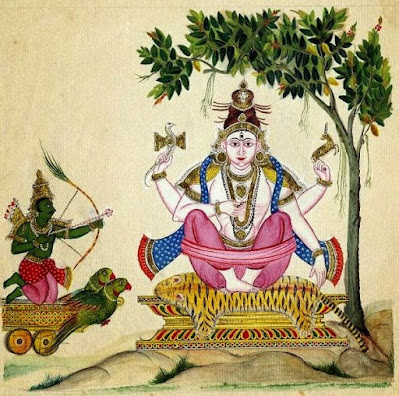When the photographs of each day of this Festival are uploaded to the Arunachala Samudra website, I will provide a link here on Arunachala Grace.
Vasantha Utsavam is
a ten day Festival observed at Arunachaleswarar Temple, Tiruvannamalai which
celebrates the arrival of the spring season and depicts the blossoming of love.
It also re-enacts the famed legend of the burning into ashes of Kama, the God
of Love and the resurrection of Kama out of the burnt ashes. The festival
generally occurs between the end of March and during part of April. In 2021 the
date of this festival ran from Saturday April 17 to Monday April 26.
The deity of this festival is Lord Somaskanda, a form of Shiva and Parvathi, whose shrine is located in the south-west corner, second prakaram of the Siva Sannidhi Temple. Traditionally during this Festival, the Gods are gorgeously decorated and with great ceremony taken upon Mahapradakshina i.e. round the sacred Mahila Maram (trees) within the Third Prakaram—ten times every night for ten days = 100 times. The significance of the "Makila Maram" comes from the Tamil verb which means to enjoy and denotes joy and exultation. In addition the word makila is often pronounced makuta which means crown and refers to the coronation of Lord Shiva as the sovereign of the universe.
The third day of Vasantha Utsavam is designated as the day of the birth of Manmatha, also known as Kama the God of love. At 9 p.m. on the fifth and eighth days the Temple lights are switched off so that the procession is in the dark. After going around the sacred Mahila Maram ten times the lights are switched back on to great rejoicing.
During this sacred Festival the Jumbo Keswara Lingam, that is set in stone on the raised platform in the midst of the sacred trees is filled to capacity with water. Plants and flowers are placed to float inside the recess of the Lingam, appearing to make the Lingam levitate and blossom.
Kamdev and Rati
interrupt Shiva's meditation
Kama, The God of
Love
When Lord Siva saddened
by the death of his wife Sati decided to renounce the world, the Devas became
afraid for the fate of the universe. The Gods went to Brahma and said,
"Our foes, the Asuras have once again become powerful. It has been
foretold that only the son of Siva can lead us to victory. The Lord has lost
his wife and has become a hermit, forsaking us all. We dare not approach him,
but it is absolutely essential that he wed again, and beget a son who will be
our savior. What should we do?"
Brahma replied that Sati had reincarnated as the daughter of the Himavan king of the mountains and that she had resolved to obtain Siva for a husband and for this purpose had been performing severe penance. To ensure a meeting between the two, the Gods arranged for Parvati to serve Siva while he was performing his austerities.
However Indra became impatient and sent for Kama, the God of love and said, "O Kama, only you can save the Devas. For our welfare, it is required that Siva marry Parvati. She is at present waiting on Siva, but the Lord has not even noticed her presence. Go immediately and make him fall in love with her."
Kama went to the desolate forest where Siva was deep in meditation. He was accompanied by spring, and in an instant the entire forest was transformed into a beautiful garden. The time was ripe and Kama fitted one of his flower-arrows into his bow of sugarcane and let the arrow fly, aiming at the heart of Lord Siva. The arrow struck its target and Siva opened his eyes. He instantly fell in love with Parvati. However, his anger rose when he realized that Kama had interfered. Siva then opened his third-eye, and gazed with blazing anger at Kama, the God of love. Such was the potent power of Siva's gaze that Kama was instantly reduced to ashes.
Seeing her husband's death, Rati fell at the feet of Siva and beseeched him to spare her husband. At last, moved by her desperate pleas, Siva relented and brought Kama back to life but declared that Kama would thereafter be formless.
From that day on, Manmatha has not had a physical form. Neither Gods nor mortals can perceive him. He does his work unobserved, aided by his flower tipped arrows of love.
The death and resurrection of Kama represent the spiritual truth of how after the ego is destroyed, one is reborn as pure eternal Being. The fact that the flames from the third eye of Shiva burn Kama signifies that the third eye of Jnana (knowledge) in one’s heart must be opened in order for the ego (ignorance) to be destroyed for no darkness can prevail when the light of knowledge shines.
Kama the God of Love
Kama the God of Love
is also known as Manmatha, one of the mind-born son of Lord Brahma Dev. Some
accounts say he was the mind-born son of Lord Vishnu. Rati was his consort.
 |
| Kama directing arrow at Lord Siva |
Kamadeva is represented as a young, handsome winged man with green skin who wields a bow and arrows with a parrot as his vehicle. His bow is made of sugarcane with a string of honeybees, and his arrows are decorated with five kinds of fragrant flowers.
The flowers on his arrows are: Aravinda (White Lotus), Ashoka, Cuta (Mango Flower), Navamalika (Jasmine) and Nilotpala (Blue Lotus). Also known as Unmada, Tapana, Shoshana, Stambhana and Sammohana.
Kamadeva has five arrows which are sometimes associated with five effects that desire has on one afflicted by it. Kamadeva's five arrows are said to be fascination, disturbance, burning, desiccation and destruction.
 |
| White Lotus |
 |
| Ashoka Flower |
 |
| Mango Flower |
 |
| Jasmine Flower |
 |
| Blue Lotus |